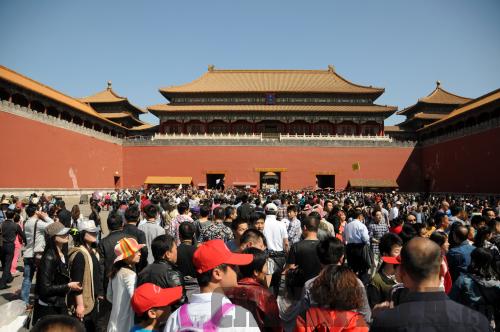|
 |
|
New tourism law gives tourists a better deal (WANG ZHEN) |
Zhu Feng has sworn that he will never again go on any tours organized by tourist agencies after having a terrible experience in February this year. Zhu, a resident of Beijing , recalled that during his five-day trip to Hong Kong, he was forced to spend at least three hours each day in shops or visiting unknown and uninteresting "tourist attractions."
"The trip seemed cheap but it turned out to be a complete waste of time," said Zhu, who spent several thousand yuan on overpriced products while on his trip. "I had heard before that if no one spends money in the shops that they have you visit on the tour, the tour guide's attitude will change, and you will feel uncomfortable."
Experiences like Zhu's are common. China's tourism sector has long suffered from a less-than-stellar reputation, due in large part to the lack of regulation. Almost 3 billion domestic trips are made in China every year, but until recently, the country had no laws governing its tourism industry. Tourist complaints, which have been mounting for years, will now hopefully be addressed after the introduction of a new tourism law that was passed on April 25.
Tourism laws
The new law is designed to safeguard tourists' rights and curb the sector's problematic practices, including inflated ticket prices and operators that offer cheap tours but then pressurize clients to buy local souvenirs and products. Predatory business practices like these have been causing problems for unsuspecting tourists for years.
The long-awaited law is also the first to be passed by the Standing Committee of the 12th National People's Congress.
Hong Kong, which has been a popular tourist destination for Chinese mainland visitors for years, is the subject of a huge number of complaints about "zero- or negative-fare tours," which are cheap tours that try to force participants to purchase goods, or that involve last-minute itinerary changes.
Several years ago, video of a Hong Kong tour guide berating tourists for not spending money in shops triggered public debate and brought the illicit practices plaguing the tourism industry into the public spotlight.
"It's hard to find a travel agency that you can trust," said Zhu. "All the agencies, small or large, offer similar travel packages. You are left with no other options."
The new law outlines measures specifically designed to address these industry problems. It includes a clear statement prohibiting travel agencies from offering tours for unreasonably low prices to entice tourists, and then making up for any financial deficits by charging additional fees or receiving kickbacks from mandatory shopping stops that pressure tourists to spend extra money.
The law also stipulates that tour contracts should clearly lay out the itineraries, content and duration of all tours, including transportation, hotel and dining arrangements.
Shen Hai'en, a law professor at Beijing International Studies University, explained that deceptive zero-fee tours and shopping kickbacks are the product of vicious competition within the tourism industry.
According to Wang Tianxing, who helped draft the new law, the low salaries of tour guides is another primary reason for these predatory tour arrangements. To counteract this, the new tourism law highlights protecting the work- and pay-related rights of tour guides.
|